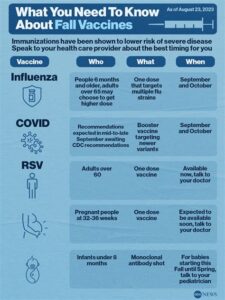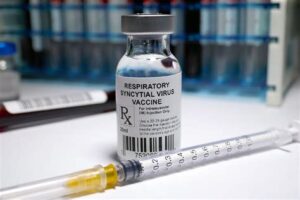Explore the interplay between COVID and RSV vaccines, including research, recommendations, and the potential benefits and risks of concurrent vaccination.As the world continues to navigate the complexities of respiratory viruses, the availability of vaccines for both COVID-19 and Respiratory Syncytial Virus (RSV) has become crucial in safeguarding public health. With healthcare professionals and policymakers exploring innovative strategies to enhance vaccination efforts, one pressing question emerges: can these two vaccines be administered simultaneously? In this blog post, we will delve into the current understanding of COVID and RSV vaccines, examine recent research on concurrent vaccinations, and discuss the recommendations surrounding this approach. Additionally, we will weigh the potential benefits against the risks of combining these vaccinations. Join us as we unpack the latest insights and findings, empowering you with the information needed to make informed health decisions in the face of ongoing viral challenges.
Understanding COVID and RSV Vaccines
The landscape of viral infections has changed significantly with the emergence of COVID-19 and the resurgence of Respiratory Syncytial Virus (RSV). Both viruses pose serious health threats, particularly to vulnerable populations such as infants, the elderly, and individuals with underlying health conditions. Understanding the COVID and RSV vaccines is crucial for effective prevention and control of these diseases.
The COVID-19 vaccine is designed to enhance the body’s immune response against the SARS-CoV-2 virus. There are various vaccines available that utilize mRNA technology, viral vectors, and inactivated viruses. On the other hand, the RSV vaccine aims to protect against RSV, a common virus that can lead to severe respiratory infections in young children and older adults. Recent advancements in vaccine development have paved the way for potential vaccines that could provide broad protection against these viruses.
As vaccination becomes more widespread, questions arise about potential interactions between these vaccines. Health authorities are continuously studying the safety and efficacy of administering the COVID and RSV vaccines concurrently. Early research suggests that simultaneous vaccination may be feasible and could streamline immunization efforts, but co
Can COVID and RSV Vaccines Be Given Together?
The question of whether COVID and RSV (Respiratory Syncytial Virus) vaccines can be administered together has gained significant attention in recent months. As public health efforts continue to combat respiratory viruses, understanding the potential for simultaneous vaccination is crucial. Studies have shown a promising outlook regarding the safety and efficacy of combining these vaccines.
Health authorities, including the CDC, emphasize the importance of vaccination in preventing severe illness from both COVID and RSV. Recent clinical trials have indicated that providing both vaccines on the same day does not compromise the immune response. In fact, getting vaccinated against both diseases concurrently allows individuals to protect themselves more efficiently, particularly during peak respiratory virus seasons.
It’s equally essential to consider individual health circumstances when discussing the concurrent administration of these vaccines. Individuals who are immunocompromised or have specific health concerns should consult with healthcare providers to determine the best vaccination strategy for their needs.
Research on Concurrent COVID and RSV Vaccination
In recent years, the emergence of respiratory illnesses like COVID-19 and Respiratory Syncytial Virus (RSV) has raised important questions regarding vaccination strategies. The simultaneous administration of these vaccines is a topic of significant interest among researchers and healthcare professionals.
Several studies have begun to explore the safety and efficacy of administering the COVID-19 vaccine alongside the RSV vaccine. Early findings suggest that there is no significant increase in adverse effects when these vaccines are given together. A meta-analysis published in a peer-reviewed journal indicated that patients who received both vaccines concurrently experienced similar side effects to those who received them separately.
Moreover, the potential benefits of concurrent vaccination are substantial. By reducing the number of visits required to protect against both viruses, patients may experience increased vaccination rates, ultimately contributing to herd immunity. As the research continues to evolve, it is crucial for healthcare decision-makers to consider the data and recommendations emerging from ongoing studies.
Recommendations for Simultaneous COVID and RSV Vaccination
As the world continues to navigate through the challenges posed by respiratory diseases, the recommendation for simultaneous COVID and RSV vaccination has become a topic of increasing interest. Understanding the implications of administering both vaccines at the same time can have a significant impact on public health.
Health organizations suggest that vaccinating against multiple viruses, such as COVID-19 and RSV (Respiratory Syncytial Virus), can streamline the vaccination process, potentially leading to increased vaccine uptake. According to recent studies, receiving both vaccines concurrently does not compromise the effectiveness of either vaccine. In fact, this approach can be particularly beneficial for vulnerable populations who may struggle to attend multiple vaccination appointments.
Moreover, health authorities emphasize the importance of monitoring for any adverse reactions post-vaccination. While the likelihood of experiencing side effects from both vaccines simultaneously is low, it is crucial for healthcare providers to inform patients about what to expect. This proactive approach can help ensure a safer and more comfortable vaccination experience for individuals.
Potential Benefits and Risks of Combined Vaccination
As we navigate the ongoing challenges posed by respiratory viruses, understanding the potential benefits and risks of combined vaccination for COVID-19 and RSV is essential. The decision to receive both vaccines at the same time can have implications for individual health and public health outcomes.
One of the significant benefits of receiving the COVID and RSV vaccines simultaneously includes increased convenience. Patients can minimize the number of visits to healthcare facilities, thereby saving time and reducing exposure to infections. Additionally, co-administration of vaccines has shown no major negative interactions, making it an attractive option for many individuals.
However, there are risks associated with combined vaccination. Some patients may experience heightened side effects, such as soreness at injection sites or flu-like symptoms. Furthermore, there is a potential for confusion in tracking side effects if both vaccines are administered at the same time. It’s important for healthcare providers to weigh these factors when recommending vaccinations.
Frequently Asked Questions
Can COVID-19 and RSV vaccines be administered together?
Yes, studies suggest that it is safe to administer COVID-19 and RSV vaccines at the same time.
What are the benefits of getting the COVID-19 and RSV vaccines simultaneously?
Getting both vaccines at the same time can streamline vaccination efforts and ensure protection against both viruses without requiring multiple visits.
Are there any risks associated with receiving the COVID-19 and RSV vaccines together?
While there may be mild side effects from either vaccine, data indicates that receiving both vaccines simultaneously does not significantly increase the risk of adverse effects.
How effective are the COVID-19 and RSV vaccines when given at the same time?
Clinical trials have shown that both vaccines maintain their efficacy levels when administered together.
Is there a specific age group that should not receive both vaccines at the same time?
Current guidelines generally allow for simultaneous vaccination in eligible age groups, but it’s important to consult healthcare providers for individual recommendations.
What should I discuss with my doctor before getting both vaccines together?
It’s advisable to discuss your vaccination history, any allergies, or underlying health conditions with your doctor prior to receiving both vaccines simultaneously.
Can I receive other vaccines along with COVID-19 and RSV vaccines?
Yes, it is possible to receive other vaccines alongside COVID-19 and RSV vaccines, but it’s best to consult with a healthcare provider for personalized advice.





